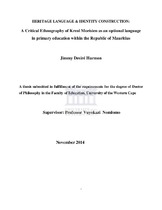| dc.description.abstract | This research is a critical ethnography of KM in primary schools. Its purpose is to explore the link between heritage language and identity construction. My central research question is: how does the introduction of KM as an optional language in primary education shape Creole pupils' language identity construction in Mauritius? The research studied the overall impact of KM on two schools which I selected as research sites. Research participants were pupils of Standard I-II-III, head of schools, teachers and parents. I also selected some key informants. The study was placed within the international literature on heritage language and identity construction. The research is significant in the sense that it was conducted at the initial stages of the introduction of KM in schools. It might be of interest for future studies as its findings would serve to understand the place of KM in schools. At the same time looking at KM as a heritage language set against the 'ancestral languages' has not been done before. It contributes to other ways of looking at 'heritage' in a global world. I elaborated a conceptual framework based on classical Marxism, post-structural Marxism, French theories and post-colonial studies. I applied critically the theoretical lens in the Critical Theory Tradition which basically challenges the status quo. This study drew implications for language teaching policy and practice and the teaching of KM as a tool for empowerment and human agency. This research indicated the learners' views as to how their exposure to Kreol Morisien in the classroom shapes their ability to construct new, desired identities within local, national or global communities. The research design was based on a critical ethnographic approach whereby the researcher and the participants find themselves in a reciprocal human experience. Research instruments that were used were ethnographic interviews, class observations, document analysis complemented by the Delphi Method which is a forecast study of future trends. I got five findings. First, Creole consciousness movement underpinned the introduction of KM as an optional language in primary education. Second, parents chose KM on a purely utilitarian basis. Third, the curriculum and syllabus do not reflect and support the Creole identity and culture. Fourth, there was an invisibility and ambiguity about Creole culture in the school textbook. Finally, the pedagogy used to teach KM as an optional language created motivation and self-esteem. This study which was conducted during the first three years of the introduction of KM in two primary schools indicates that the presence of KM did not however, really enhance the identity of the Creole children as the curriculum, syllabus and textbook did not reflect and support the Creole culture and identity. KM was an additional language subject which certainly seduced by its novelty but it did not bring great changes as were expected. But KM does open avenues for adjustments and initiatives for an alternative programme in KM as heritage language and culture which could be implemented outside school. Such initiative would foster KM in its double identity of being both an ethnic and national language plus its future use as medium of instruction. | en_US |

